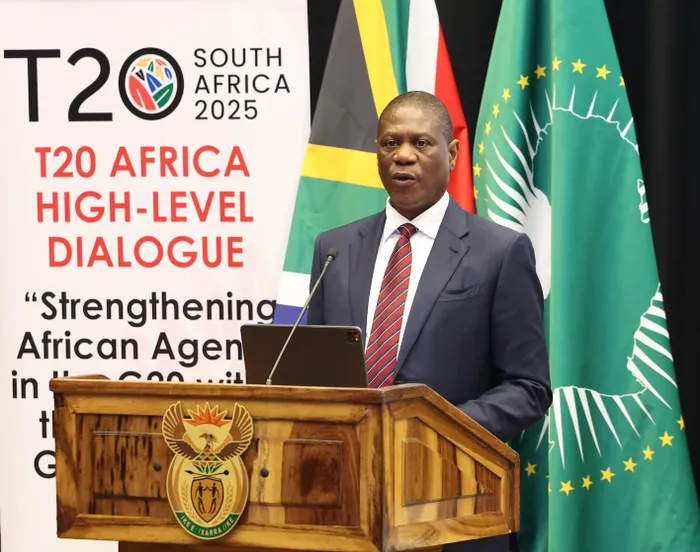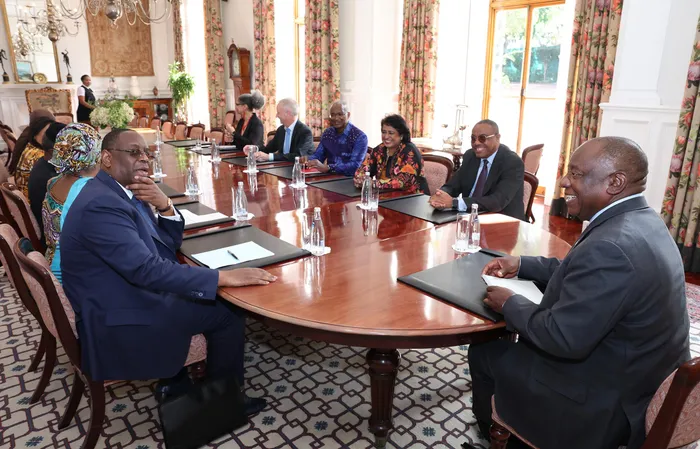G20 Summit: A Mountain to Climb for Africa

Deputy President Paul Mashatile delivered the keynote address at the two-day T20 Africa High-Level Dialogue at the CSIR International Convention Centre in Pretoria, on April 29, 2025.
Image: AFP
Ashraf Patel
South Africa and Africa host the G20 under severe geopolitical and geoeconomic storms from trade wars to massive cuts in ODA from the US and EU. In this context, development finance, debt and, international tax policy intersect on a fraught vortex, one that needs resolution.
From the UN Tax Convention and G20 Common Debt Frameworks and the IMF-World Bank Spring meetings, global policy elites, under severe pressure need to find ways to achieve resource mobilisation targets for the UN SDGs.
As SA hosts the G20, the addition of the G20 Expert panel also adds urgency to the need for financial and development consensus. The UN's Seville Finance for Development Summit in June, held once a decade will provide the ‘broad global consensus on Finance’. Will the G20 cohere or derail at a time when the geopolitics are fracturing at a velocity unseen in decades?
The issue of the African debt crisis, Illicit financial flows, the UN Treaty and the G20 Common framework are key areas that will occupy finance ministers in finding consensus. The High-Level Panel Report on illicit financial flows from Africa (Mbeki Panel Report) and the High-Level Panel on International Financial Accountability and Transparency (FACTI Panel Report), have extensively outlined strategies to combat IFFs.
Unpacking the Challenges:
Global bonds: US borrowing costs are hurting the rest of the world
Last week, African Development Bank AfDB President Dr Akinwumi Adesina, at the launch of Macroeconomic Performance and Outlook (MEO) of the African continent on April 12, was vocal against the unfair allocation of the International Monetary Fund’s (IMF) Special Drawing Rights (SDRs), noting that the continent received a measly $33 billion from the global lender, 4.5% of the $650 billion issued globally. Hence, the African agenda at the G20 is a mountain to climb.
In the same week, a new Cost of Capital, report by Jeffry Sachs et al of Columbia University was more concerning:
Within the African context, Africa’s median public debt ratio has been on an upward trajectory since the beginning of this decade from 54.5% of GDP in 2019, to 64% in 2020, moving to around 63.5% from 2021–23 according to the Africa Economic Outlook 2024 report. In addition to this, the flow of FDI, ODA, portfolio investments and remittances dropped by 19.4 % in 2022. With high debt servicing costs, and strained tax capacities as evidenced by a median of a tax to GDP ratio of 14% in Africa, this region is experiencing constrained fiscal space which is crowding out financing for critical public services such as health and education. On the streets of African capitals, cost of living riots are mushrooming. These macroeconomic outlook indicators are grave and if the world economy faces a recession many nations in the global South and within Africa will be at depression-era levels. ( Sachs et al, Caos of Capital report, Columbia University)
The unfortunate truth is that both public and private resources have not been enough to finance the development needs of Africa and other Global South countries, especially in the wake of major economic shocks. Access to finance through the global financial architecture has been particularly difficult for many developing countries with little to no access to concessional loans/grants, higher financing costs and limited representation in international financial institutions. Back to basics.
Bold solutions needed from South Africa's G20 2025 leadership
So given the deepening policies especially in the context of Trump 2.0 trade wars and EU Development aid budget cuts, which may see many regions going into recession, bold and even radical solutions are needed. Some suggestions:
Tobin Tax on Financial Transaction
At the dawn of the Millenium, the global community began discussion on supporting the UN Millenium MDGs, during the African debt crisis, there was a robust debate on the potential of a Tobin Tax on financial transaction. Named after Nobel laureate Dr James Tobin, the debate was shelved, but it is still relevant.
In the current polycrisis, a currency tax is a levy on international capital flows and, as such, is a regulatory and fiscal counterpart to capital liberalisation and globalisation. In an environment of diminished nation-state economic sovereignty, the idea offers the opportunity to restore some of governments’ lost taxation power and potentially raises the challenge of supranational taxation and redistribution of revenues within the international community. It has the additional advantage of being a levy on a sector that is relatively under-taxed at present. (Oxfam Tobin Tax Report, 1999)
The report cautions that there needs to be a trade-off between the aims of stabilisation and development funding. According to its advocates, a currency transaction tax would be a strategic element of global financial management since it can: a) reduce short-term, speculative currency and capital flows b) enhance national policy autonomy c) restore the taxation capacity of nation-states affected by the internationalisation of markets. The tax is an attractively simple formula for reducing destabilising flows. (Oxfam, 1999)
The profitable = revenue base of financiers and bankers consists of very short-term, two-way speculative and financial arbitrage transactions in the inter-bank market. The greater the frequency of transactions, the higher the tax charge can be applied to reduce speculation. This policy intervention appeal consists of being a disincentive to short-term transactions while not inhibiting international trade, long-term capital flows, or currency price adjustments based on changes in the real economy.

President Cyril Ramaphosa met several former African Heads of State and Government who are championing the African Leaders Initiative on Debt Relief at his official residence, Genadendal, in Cape Town on February 25, 2025.
Image: GCIS
Lowering the Cost of Capital
Late Pope Francis declared 2025 to be a Jubilee year. Given that 40% of the world’s population lives in countries that spend more on debt service than health or education, this is particularly a challenge in Africa, where 20 low-income countries are in, or at risk of, debt distress. African countries owe $655.6 billion to external creditors as of 2022, up from $283 billion a decade previously, and will pay $89.4 billion in external debt service in 2024. Debt service as a share of government spending (12%) has surpassed spending on healthcare (7.3%). (SAIIA, 2024)
Because of these high debt service costs in Africa and elsewhere, net financial flows to ‘developing countries’ turned negative in 2022, meaning that debt service exceeded official development assistance (ODA) and new financing. The proposed Cost of Capital commission offers a crucial platform for finding solutions to the unacceptable situation.
Based on an assessment of the ratings and borrowing costs of 16 African countries in 2022, the UNDP estimated that the cost to those countries of even a one-level misalignment of credit ratings cost those countries a combined $74 billion in lost investment opportunities and increased interest payments. (Sachs et al. Columbia university)
The authors Sachs et al argue that the current model is tragic, given that the growth potential of emerging markets needs new green infrastructure projects, and are also more creditworthy than typically reflected in credit ratings or institutional capital demands – resulting in untapped investment opportunities well suited for large banks and institutional investors. The cost of this mismeasurement is high – especially when considering both the loss of potential investment(s) and the net increase in borrowing costs.
Much expectation will be on the work of the G20 Common debt framework and the G20 expert group set up by President Ramaphosa in March 2025. Can they deliver a debt deal?
Comprehensive Digital Services Taxes (DSTs) in the global digital economy
The digital economy’s increasing dominance in the service economy and the mega growth of big tech corporations and titans whose market capitalisation is in the trillions now dominate Wall Street. Hence DSTs present an area of interest and opportunity to plug the global and local tax gaps. The ‘extractive‘ ad tech model of big tech has come under regulatory scrutiny with many regulatory remedies being proposed in 2025.
With rapid digital transformation and internet access, via smartphones, the global ecommerce market is now accessible to billions. The adoption of information technology today allows companies to reach consumers and users in many jurisdictions without a physical presence. For that reason, under a tax treaty, for example, countries lose a significant amount of revenue as highly profitable digital companies may not constitute a taxable presence, notwithstanding having significant economic involvement, in a jurisdiction. (Chaudury et al, IT for Change, India)
The DSTs target highly digitalized activities like online advertising, platform intermediation, social media subscriptions, search engines, cloud storage, etc, that derive incomes from market jurisdictions while paying no taxes on such incomes due to the nature of the activities.
Additionally, many countries have introduced national measures for taxing the digitalized economy, of which the most common is called a Digital Service Tax (DST). A few countries have also introduced another measure called Significant Economic Presence (SEP).
The G20 Common Framework has for years deliberated on a global minimum tax agreement of 15%. While it is a significant move the real challenges are in the details and whether nations have the technical and regulatory capacity to enforce Big Tech obligations at the national level. While the EU is a ‘regulatory superpower that can enforce large fines and penalties to the tune of hundreds of millions on Big Tech, most nations in the Global South lack that capacity and are generally at the mercy of unfair bilateral Investment treaties. Big tech is wielding enormous punitive powers and sanctions to strong-arm smaller nations and jurisdictions into lower taxes, and more incentives, thus rendering the principles of fair tax mute.
The G20 in 2025 in South Africa started with much hope in December 2025 when South Africa received the baton from Brazil. The mega ‘shock and awe’ of the early weeks of the Trump administration has disrupted this optimism. The latest Trump 2.0 tariffs war can push the world into a recession. However major powers - EU, China, BRICS Plus nations, G77, AU, MERCUSOR, ASEAN, etc are still committed to the overall principles of Multilateralism and the UN system. While there are many differences, the G20, G77 and BRICS Plus agendas should prioritise the development needs and align with the UN Pact of the Future.
A new consensus on international finance and Tax is urgently required to reform the global economy in line with solidarity and sustainability - and provide LDCs - and Africa especially with some fighting chance to achieve the UN SDGs.
Is another world possible?
* Ashraf Patel is a Senior Research Associate at the Institute for Global Dialogue, UNISA.
** The views expressed do not necessarily reflect the views of IOL, Independent Media or The African.